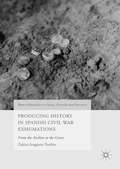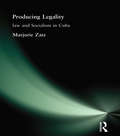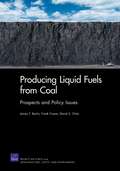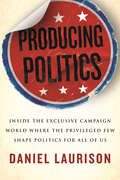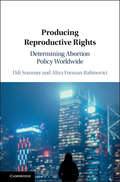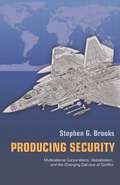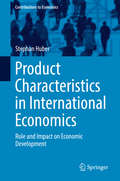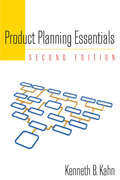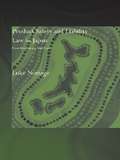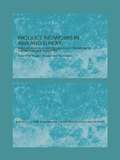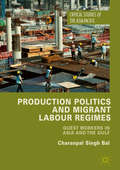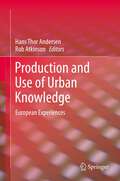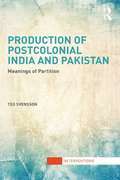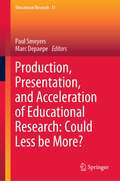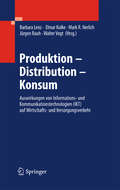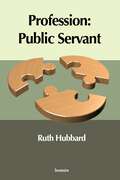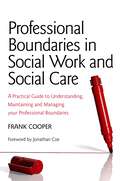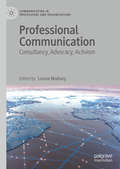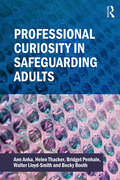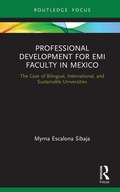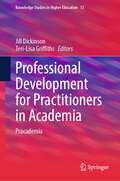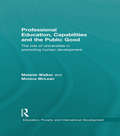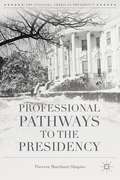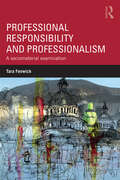- Table View
- List View
Producing History in Spanish Civil War Exhumations: From the Archive to the Grave (World Histories of Crime, Culture and Violence)
by Zahira Aragüete-ToribioThis book reflects on the new histories emerging from the exhumation of mass graves that contain the corpses of the Republicans killed in extrajudicial executions during and after the conflict, nearly eighty years after the end of the Spanish Civil War (1936-1939). In the search for, location and unearthing of these unmarked burials, the corpse, the document and the oral testimony have become key traces through which to demand the recognition of past Francoist crimes, which were never atoned, from a lukewarm Spanish state and judiciary. These have become objects of evidence against the politics of silence entertained by national institutions since the transition to democracy. Working alongside archaeologists, historians, memory activists and families, this book explores how new versions of the history of the killings are constructed at the cross-roads between science, history and family experience. It does so considering the workings of truth-seeking in the absence of criminal justice and the effects of the process on Spanish collective memory and identity.
Producing Legality: Law and Socialism in Cuba
by Marjorie ZatzProducing Legality provides a window into the official construction of socialist legality in Cuba and the dissemination of this legal consciousness throughout the country. It links abstract theories of lawmaking and the state with the specific dilemmas confronting individual policymakers to detail the inner workings of the Cuban legal order.
Producing Liquid Fuels from Coal
by David S. Ortiz Frank Camm James T. BartisLarge U.S. coal reserves and viable technology make promising a domesticindustry producing liquid fuels from coal. Weighing benefits, costs, andenvironmental issues, a productive and robust U.S. strategy is to promote alimited amount of early commercial experience in coal-to-liquids productionand to prepare the foundation for managing associated greenhouse-gasemissions, both in a way that reduces uncertainties and builds futurecapabilities.
Producing Politics: Inside the Exclusive Campaign World Where the Privileged Few Shape Politics for All of Us
by Daniel LaurisonThe first book to uncover the hidden and powerful role campaign professionals play in shaping American democracy by delving into the exclusive world of politicos through off-the-record interviewsWe may think we know our politicians, but we know very little about the people who create them. Producing Politics will change the way we think about our country&’s political candidates, the campaigns that bolster them, and the people who craft them.Political campaigns are designed to influence voter behavior and determine elections. They are supposed to serve as a conduit between candidates and voters: politicos get to know communities, communicate their concerns to candidates, and encourage individuals to vote. However, sociologist Daniel Laurison reveals a much different reality: campaigns are riddled with outdated strategies, unquestioned conventional wisdom, and preconceived notions about voters that are more reflective of campaign professionals&’ implicit bias than the real lives and motivations of Americans.Through over 70 off-the-record interviews with key campaign staff and consultants, Laurison uncovers how the industry creates a political environment that is confusing, polarizing, and alienating to voters. Campaigns are often an echo chamber of staffers with replicate backgrounds and ideologies; most political operatives are white men from middle- to upper-class backgrounds who are driven more by their desire to climb the political ladder than the desire to create an open conversation between voter and candidate.Producing Politics highlights the impact of national campaign professionals in the US through a sociological lens. It explores the role political operatives play in shaping the way that voters understand political candidates, participate in elections, and perceive our democratic process—and is an essential guide to understanding the current American political system.
Producing Reproductive Rights: Determining Abortion Policy Worldwide
by Udi Sommer Aliza Forman-RabinoviciWith events and movements such as #MeToo, the Gender Equality UN Sustainable Development Goal, the Irish and Chilean abortion policy changes, and the worldwide Women's March movement, women's rights are at the top of the global public agenda. Yet, countries around the world continue to debate if and how women should have access to reproductive rights, and specifically abortion. This book provides the most comprehensive comparative review of this topic to date. How are reproductive rights produced? This book analyzes three spheres of influence on abortion policymaking: civil society, national government, and international bodies. It engages scholars as well as undergraduate and graduate students in social sciences, law, gender studies, and development and sustainability studies. With insights into the influence of intergovernmental bodies, international health organizations, state-level political representatives, and religious civil society players, this book will be of interest to policymakers, organizations and individuals concerned with influencing reproductive policy.
Producing Security: Multinational Corporations, Globalization, and the Changing Calculus of Conflict (Princeton Studies in International History and Politics #102)
by Stephen G. BrooksScholars and statesmen have debated the influence of international commerce on war and peace for thousands of years. Over the centuries, analysts have generally treated the questions "Does international commerce influence security?" and "Do trade flows influence security?" as synonymous. In Producing Security, Stephen Brooks maintains that such an overarching focus on the security implications of trade once made sense but no longer does. Trade is no longer the primary means of organizing international economic transactions; rather, where and how multinational corporations (MNCs) organize their international production activities is now the key integrating force of global commerce. MNC strategies have changed in a variety of fundamental ways over the past three decades, Brooks argues, resulting in an increased geographic dispersion of production across borders. The author shows that the globalization of production has led to a series of shifts in the global security environment. It has a differential effect on security relations, in part because it does not encompass all countries and industries to the same extent. The book's findings indicate that the geographic dispersion of MNC production acts as a significant force for peace among the great powers. The author concludes that there is no basis for optimism that the globalization of production will promote peace elsewhere in the world. Indeed, he finds that it has a net negative influence on security relations among developing countries.
Producing and Negotiating Non-Citizenship
by Patricia Landolt Luin GoldringMost examinations of non-citizens in Canada focus on immigrants, people who are citizens-in-waiting, or specific categories of temporary, vulnerable workers. In contrast, Producing and Negotiating Non-Citizenship considers a range of people whose pathway to citizenship is uncertain or non-existent. This includes migrant workers, students, refugee claimants, and people with expired permits, all of whom have limited formal rights to employment, housing, education, and health services.The contributors to this volume present theoretically informed empirical studies of the regulatory, institutional, discursive, and practical terms under which precarious-status non-citizens - those without permanent residence - enter and remain in Canada. They consider the historical and contemporary production of non-citizen precarious status and migrant illegality in Canada, as well as everyday experiences of precarious status among various social groups including youth, denied refugee claimants, and agricultural workers. This timely volume contributes to conceptualizing multiple forms of precarious status non-citizenship as connected through policy and the practices of migrants and the institutional actors they encounter.
Product Characteristics in International Economics: Role And Impact On Economic Development (Contributions to Economics)
by Stephan HuberNational economies are linked through flows of capital and goods. This book addresses those linkages, analyzes their benefits for economic development, and evaluates a country’s opportunities to reap the best possible rewards by influencing the linkages. The book focuses on the role of product characteristics in international economics and their impact on economic development. After an introduction to the topic, it analyzes the influence of product sophistication on growth, and offers alternative means of measuring product characteristics. In turn, the book provides evidence for the impact of foreign equity on the characteristics of the products that firms produce. Moreover, it presents empirical findings that prove that the quality of a country's legal and institutional framework is influenced by said country’s predisposition to trade rule-of-law-intensive goods.
Product Planning Essentials
by Kenneth B. KahnConcise yet comprehensive, Product Planning Essentials, Second Edition, addresses the complex, interdisciplinary nature of product development and product management. It covers strategic issues that emerge during the product life cycle, including identifying opportunities, idea generation and evaluation, technical development, commercialization, and eventual product dismissal. Instructors, students, and practitioners will appreciate the balanced managerial and how-to orientation. Changes to the Second Edition • Addition of two chapters on design and legal considerations. • Expanded discussion of global considerations to introduce sustainable product development and Base of the Pyramid (BoP) product development. • Simplified technical discussions of planning techniques for improved comprehension. • Inclusion of product planning best practices from recent noteworthy cases and studies in the final chapter.
Product Safety and Liability Law in Japan: From Minamata to Mad Cows
by Luke NottageDeveloping insights from a number of disciplines and with a details analysis of legislation, case law and academic theory, Product Safety and Liability Law in Japan contributes significantly to the understanding of contemporary Japan, its consumers and its law. It is also of practical use to all professionals exposed to product liability regimes evolving in Japan and other major economies.
Production Networks in Asia and Europe: Skill Formation and Technology Transfer in the Automobile Industry (The University of Sheffield/Routledge Japanese Studies Series)
by Yuri Sadoi Rogier BusserThis book explores Japanese investment in Europe and Southeast Asia, in relation to the automobile industry. In Part I the authors examine industrial organization and policy issues in Thailand, Malaysia, The Philippines and Indonesia, looking at Japanese investment and the relative policy successes and failures in these host countries. Part II looks at skill formation systems in the Japanese dominated automobile industry in Southeast Asia and in Part III the authors focus on the EU and the very different influence of Japanese investment.
Production Politics and Migrant Labour Regimes: Guest Workers in Asia and the Gulf (Critical Studies of the Asia-Pacific)
by Charanpal Singh BalThis book emphasizes the importance of production politics, or struggles in the workplace between workers and their employers, for understanding migrant labour regimes in Asia and the Gulf. Drawing from a study of Bangladeshi construction workers in Singapore, as well as on comparative material in the region, Bal shows that migrant labour politics are significantly influenced by the specific form of production politics as well as their variable outcomes. In contrast to contentious politics approaches, this book sheds light on the extent to which migrant labour regimes can be contested by workers and civil society groups and explains the recent rise in migrant labour unrest in the region.
Production and Use of Urban Knowledge
by Hans Thor Andersen Rob AtkinsonThis book provides new insights on cities and the nature of urban development, and the role of knowledge management in urban growth. It considers how knowledge informs policies and supports decision making, and can assist in addressing the drivers of urban change. The way that knowledge is produced and used in urban development is analysed, with examples drawn from a range of European countries. This book illustrates how the development and implementation of policies for urban areas can draw on knowledge management, even as the knowledge economy itself stimulates the evolution of the city as a place of innovation and creativity. Whilst knowledge grows in importance, so do urban issues, particularly in economic and political contexts at both European and national levels. These essays explore growth in the range of knowledge available in urban contexts, the ways to generate new knowledge from a wide range of stakeholders, and how these can make an effective contribution to decision making processes in urban development. The attractiveness of cities and surrounding areas to knowledge based forms of industry and investment and the competitiveness and performance of cities are a matter of major concern for national governments. In a sense it has become too important to leave to city politicians, and it is a topic requiring sustained reflection. This book gives the reader a detailed understanding of the issues involved and prompts further reflections.
Production of Postcolonial India and Pakistan: Meanings of Partition (Interventions)
by Ted SvenssonThis work seeks to examine the event and concurrent transition that the inauguration of India and Pakistan as ‘postcolonial’ states in August 1947 constituted and effectuated. Analysing India and Pakistan together in a parallel and mutually dependant reading, and utilizing primary data and archival materials, Svensson offers new insights into the current literature, seeking to conceptualise independence through partition and decolonisation in terms of novelty and as a ‘restarting of time’. Through his analysis, Svensson demonstrates the constitutive and inexorable entwinement of contingency and restoration, of openness and closure, in the establishment of the postcolonial state. It is maintained that those involved in instituting the new state in a moment devoid of fixity and foundation ‘anchor’ it in preceding beginnings. The work concludes with the proposition that the novelty should not only be regarded as contained in the moment of transition. It should also be seen as contained in the pledge, in the promise and the gesturing towards a future community. Distinct from most other studies on the partition and independence the book assumes the constitutive moment as the focal point, offering a new approach to the study of partition in British India, decolonisation and the institutional of the postcolonial state. This work will be of great interest to students and scholars of international relations, South Asian studies and political and postcolonial theory.
Production, Presentation, and Acceleration of Educational Research: Could Less be More? (Educational Research #11)
by Paul Smeyers Marc DepaepeIs educational research chasing the trends one can observe in big sciences, mimicking what happens, some would say successfully, elsewhere in academia? The question in the title of this edited collection took its inspiration from a verse by Goethe: Wer Großes will, muss sich zusammenraffen. In der Beschränkung zeigt sich erst der Meister. Such confinement or limitation that may show mastery does not characterize at all the present state of the educational research publication scene. Instead, there have never been more of such publications which follow each other with an increasing speed. It may therefore be interesting to delve into the reasons of this development that is characteristic of what is published in this field as in many or almost all fields of scholarly work. The chapters in this collection address aspects of the (re)presentation, dissemination and reception, and the production and acceleration of educational research. An international group of scholars, philosophers and historians of education, address questions such as ‘Why publish?’, ‘The lust for academic fame’, ‘Why educational historiography is not an unnecessary luxury?’, and ‘Ways of knowing’. The twelve chapters are preceded by an introduction where issues of plurality and diversity in the study of education are at centre stage and followed by an Epilogue written by the Editors of the Springer Series Educational Research. Paul Smeyers and Marc Depaepe offer some final reflections after a journey of two decades that took them and the colleagues participating in the Research Community from 1999 till 2018 floating on the current of the Zeitgeist that carried the Discipline of Education. They claim finally that mastery in the study of education requires restraint.
Produktion - Distribution - Konsum
by Elmar Kulke Barbara Lenz Jürgen Rauh Mark R. Nerlich Walter VogtDie zunehmende Bedeutung von Informationsflüssen für die Wertschöpfung geht einher mit einer wachsenden Kohärenz der Wertschöpfungsketten. Kenntnisse darüber sind für die strategische Planung in der Politik wie in Unternehmen gleichermaßen wichtig. Die Beiträge des Buchs untersuchen die Auswirkungen von Informations- und Kommunikationstechnologien auf Güter- und Informationsflüsse zwischen Herstellern und Endverbrauchern. Dazu werden Güter- und Informationsflüsse entlang von Produktions- und Distributionsprozessen dargestellt und analysiert.
Profession: Public Servant
by Ruth HubbardProfession: Public Servant offers glimpses into the federal government’s corridors of power during a decade of profound change and underscores the importance of learning for individuals, groups, and organizations in today’s fast-paced world. It sets out a former deputy minister’s take on the “burden of office” of the role and in the difficulties of staying out of one ditch—excessive concern with safeguarding a few key principles—without sliding into another—being too anxious to please or too tempted to put personal interests first. The story emphasizes the constructive contribution of experience and imagination, especially when it is enriched by on-the-job reflection.
Professional Communication: Consultancy, Advocacy, Activism (Communicating in Professions and Organizations)
by Louise MullanyThis edited book presents contemporary empirical research investigating the use of language in professional settings, drawing on the contributions of a set of internationally-renowned authors. The book takes a critical approach to understanding professional communication in a range of fields and global contexts. Split into three parts, covering Business and Organisations, Healthcare, and Politics and Institutions, the contributors explore how and why academics engage in workplace research which takes the form of 'consultancy', 'advocacy' and 'activism'. In light of an ever-changing, ever-demanding global landscape, this volume offers new theoretical and methodological ways of conducting professional communication research with real-world impact. It will be of interest to linguistics and communication researchers and practitioners, particularly those working in sociolinguistics, discourse analysis, business communication, health communication, political communication, language and the law and organisational studies.
Professional Curiosity in Safeguarding Adults
by Bridget Penhale Ann Anka Helen Thacker Walter Lloyd-Smith Becky BoothThis is an essential text for students at all levels studying social work, nursing and allied health and social care, focusing on the need for professional curiosity and partnership work in safeguarding adults. Professional curiosity is a vital element of professional health and social care practice, yet information and guidance are scarce. Considering the post-pandemic landscape and the legal policy context of partnership work, this text provides a detailed examination around definitions of professional curiosity and what those mean in practice in relation to vulnerable adults. Real life examples are woven throughout based on serious case reviews, safeguarding adults’ reviews, domestic homicide reviews and extensive research, and there are numerous opportunities for readers to test their knowledge and skills.
Professional Development for EMI Faculty in Mexico: The Case of Bilingual, International, and Sustainable Universities (Routledge Focus on English Medium Instruction in Higher Education)
by Myrna Escalona SibajaDespite Mexico’s implementation of a bilingual model in its tertiary education programmes, this book is the first contribution to knowledge regarding EMI in Mexico. The author introduces readers to the Mexican higher education context before providing detailed information regarding the technological and polytechnic subsystem, where EMI has been implemented since 2012. The volume details a pilot and case study conducted in Mexican universities as well as the research findings and conclusions. It closes with recommendations, as well as suggestions for further research. The book explores the implications for the continuous professional development and training for lecturers in the current shift to EMI in Bilingual, International, and Sustainable (BIS) universities. This volume will be of particular interest to researchers in EMI and bilingualism.
Professional Development for Practitioners in Academia: Pracademia (Knowledge Studies in Higher Education #13)
by Jill Dickinson Teri-Lisa GriffithsThis multi-disciplinary collection addresses issues relating to current or former practitioners within the context of higher education. Drawing together a range of voices, the contributors explore contemporary issues organised around three core themes of pracademic identities, professional development, and teaching practice. Underpinned by theoretical frameworks, reporting empirical findings, and adopting a reflective lens, this critical examination draws on a range of experiences to provide a deeper understanding of the contribution of pracademics within the sector for stakeholders, including leaders, policy makers and professional bodies, and current and future pracademics. Dedicated to highlighting the potential of the pracademic contribution, this collection explores key topics including building networks, practice-informed teaching, consultancy, and collaborative research. Contributions investigate some of the practical barriers faced by pracademics making the transition into higher education, including imposter syndrome, cultural adjustment, and managing dual professional identities. The aim of this collection is to champion the benefits of a diverse academy for everyone involved.
Professional Education, Capabilities and the Public Good: The role of universities in promoting human development (Education, Poverty and International Development)
by Melanie Walker Monica McLeanThis book innovatively explores how universities might be engines of reform and be directed towards social change. Using rich case studies drawn from South African research, the book comprehensively provides a myriad of new perspectives on what constitutes a set of appropriate public-good professional capabilities that will translate successfully into contributions to human development. It challenges universities to produce professionals who have the knowledge, skills and values to improve the lives of people living in poverty in urban and rural settings. It covers issues such as: Conceptualising Public-Good Professionalism Global Issues and Professional Education South African Debates about Higher Education Institutional conditions and professional education arrangements Social Constraints on educating ethically aware public professionals By drawing on an approach that focuses on differing public-good professional capabilities in five professions, this book produces a crucial new framework for the preparation of professionals relevant to the global study of higher education policy. It expands higher education’s contribution to global social justice beyond a concern with human capital, administering a challenge to higher education internationally to address human development in the 21st century. This book will be of great interest to all scholars of higher education involved in higher education studies, comparative education, and development studies. It will also prove valuable to policy makers, higher education leaders and lecturers and graduate professionals in diverse organizations.
Professional Pathways to the Presidency
by Theresa Marchant-ShapiroDuring presidential elections a quadrennial debate emerges, wherein candidates lay claim to qualification for the presidency based on their prior professional experiences. Usually this entails invoking the legacy of one of the great presidents, who followed the same trajectory to the White House. Missing from this debate is a systematic analysis of how the different job experiences prepared the population of all presidents for service. For each of the greats who followed a particular pathway to the presidency there is at least one failure who shared the pathway. This book takes both a quantitative and descriptive approach to evaluate all the presidents systematically in order to discuss how prior professional experiences influence presidential performances.
Professional Responsibility and Professionalism: A sociomaterial examination
by Tara FenwickResponsibility and professionalism are increasingly issues of concern for professional associations, employers and educators alike. When bad things happen, professionals are often held personally accountable for complex situations. Professional Responsibility and Professionalism advances our approaches to professional responsibility from individual-centred, virtue-based prescriptions towards understanding and responding effectively to the multifaceted challenges encountered today by professionals working in dynamic complexity. The author applies a sociomaterial examination to specific examples drawn from different professional contexts of practice. She examines important implications for what professional responsibility and accountability might mean individually and collectively, and what it might be becoming when demands increasingly conflict, and when we accept that capacities for action are performed into existence in emergent and precarious webs of both human and non-human forces. The chapters explore some of the most prominent questions in professional responsibility, including: What does professional responsibility, and accountability, mean in the escalating complexities and conflicts confronting today’s professionals? How does professional responsibility become developed and enacted, and through what social and material entanglements? How should responsibility be determined in multi-agency and interprofessional practice? What happens when professional decisions are delegated to software algorithms and diagnostic instruments? How are new governing regimes of professional work, such as innovation imperatives, excessive audit and logics of blame and scapegoating, reconfiguring responsibility? How can professionals respond simultaneously to individuals in need, the obligations of their profession, the demands of their employer and an anxious society? A major concern addressed by each chapter, and the book as a whole, is educating professionals in and for responsibility. Specific dilemmas and strategies are offered for educators in universities, workplaces and professional development contexts who seek new approaches to helping professionals learn to critically understand and practise responsibility today. This book will appeal to a wide audience of education researchers and post-graduate students studying professional practice, professionalism and education across a wide range of disciplines. Health professionals, professionals working in private practices, such as law, architecture and engineering, newer professions such as social work and policing, and educational professionals at all levels will find stories and strategies reflecting key issues of their practice in this detailed exploration of professional responsibility and accountability.
